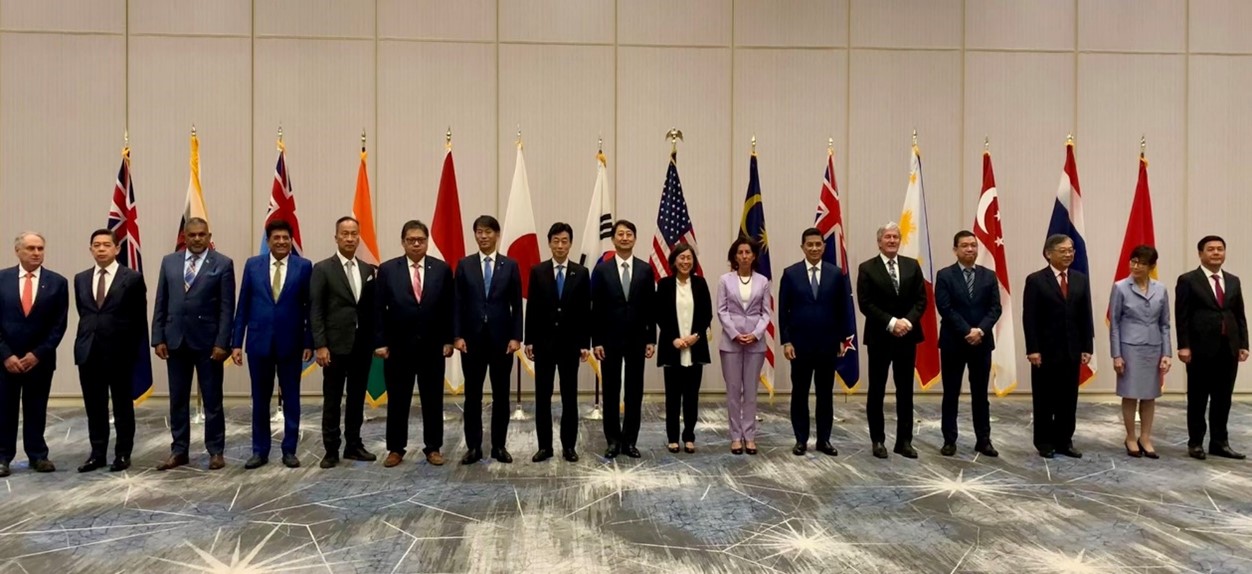- Home
- Policies
- METI Quick Reads
- Basic Economic Knowledge: The Indo-Pacific Economic Framework (IPEF), a New Framework for Economic Collaboration
Basic Economic Knowledge: The Indo-Pacific Economic Framework (IPEF), a New Framework for Economic Collaboration

Ministerial Discussion of the Indo-Pacific Economic Framework (IPEF) for Prosperity (September 2022)
In September 2022, the Ministerial Discussion of the Indo-Pacific Economic Framework (IPEF) for Prosperity was held in the United States, where the ministers from all 14 participating countries decided to commence formal negotiations. Here, we will explain the Indo-Pacific Economic Framework (IPEF) launched during President Biden's visit to Japan in May 2022, with which Japan has engaged from the beginning.
14 countries negotiating four pillars
There are 14 countries participating in the Indo-Pacific Economic Framework (IPEF): the United States, Japan, Australia, New Zealand, the Republic of Korea, India, Fiji, and seven ASEAN countries (Brunei, Indonesia, Malaysia, the Philippines, Singapore, Thailand, and Vietnam). They will negotiate four pillars with the aim of achieving a free and open Indo-Pacific on the economic front: (1) Trade, (2) Supply Chains, (3) Clean Economy (e.g., clean energy and decarbonization), and (4) Fair Economy.
How is it different from the CPTPP?
With the launch of the Indo-Pacific Economic Framework (IPEF), the United States, which withdrew from the Trans-Pacific Partnership (TPP) Agreement in January 2017, will again be economically involved in the Indo-Pacific region. Unlike the Comprehensive and Progressive Agreement for Trans-Pacific Partnership (CPTPP; an agreement that was made after the United States withdrew from the TPP and that has 11 member countries and does not include the United States), the IPEF currently does not cover market access (e.g., tariff reductions) for negotiations, but it does cover negotiations on a wide range of areas beyond conventional trade agreements. This is also an attempt to build an economic zone that includes India, Indonesia, the Philippines, Thailand, and Fiji, which are not participating in CPTPP.
Achieving inclusive and sustainable economic growth in the Indo-Pacific region
The IPEF is a new approach to regional collaboration in which the diverse countries in the Indo-Pacific region work together to create a package that strikes a fine balance between rules and cooperation and tackles 21st-century issues such as the digitalization of economics, strengthening of supply chain resilience, decarbonization, and clean energy. Japan will cooperate with each country to realize innovative, inclusive, and sustainable economic growth in the Indo-Pacific region.
Economic Partnership Division, Ministry of Economy, Trade and Industry
Related links
- Minister Nishimura Attends the Ministerial Discussion of the Indo-Pacific Economic Framework (IPEF) for Prosperity (September 13, 2022)
- Ministerial Discussion of the Indo-Pacific Economic Framework (IPEF) for Prosperity Held (July 27, 2022)
Last updated:2022-11-07